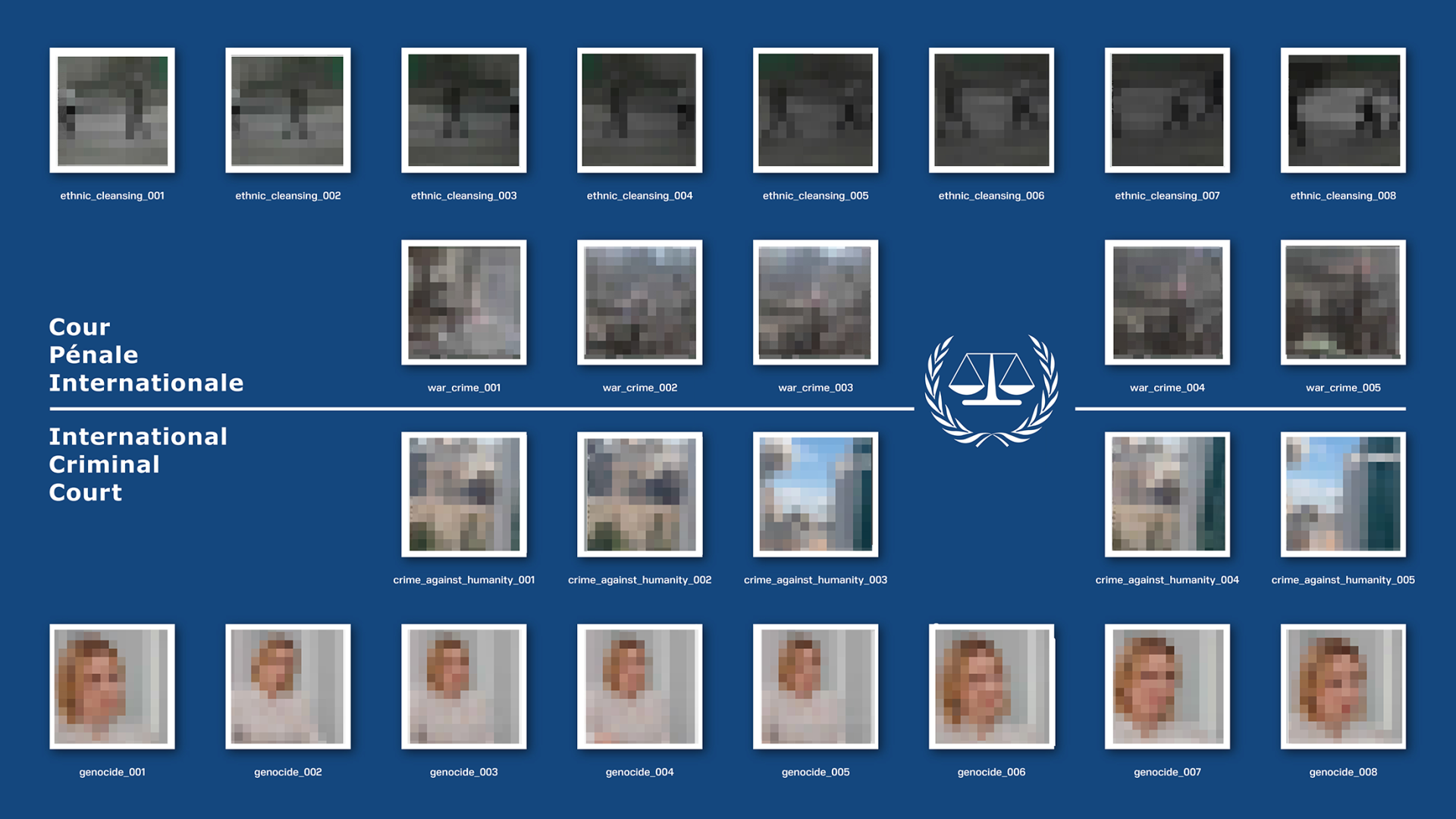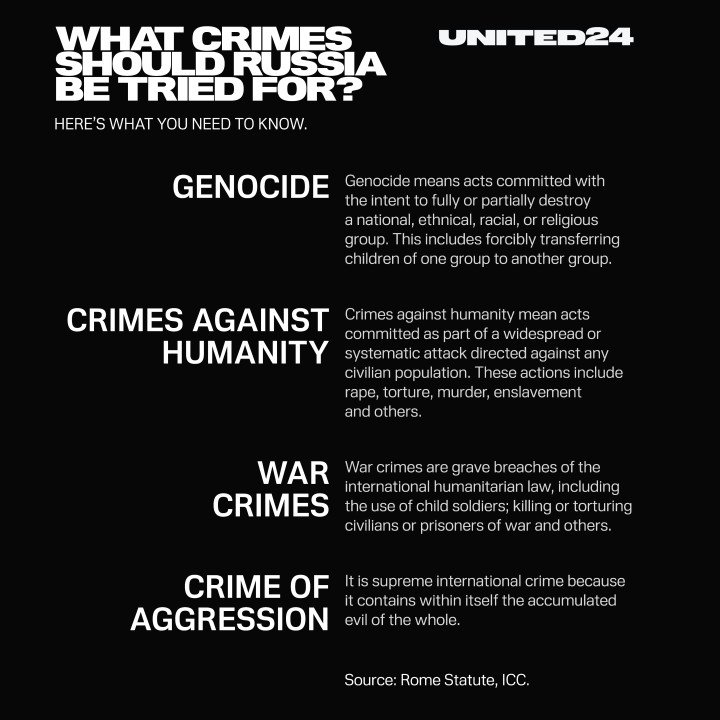- Category
- War in Ukraine
Prosecuting War Criminals Is No Easy Task, But What Can Be Done?

Evidence is being compiled by the International Criminal Court (ICC) against countless individuals responsible for war crimes in Ukraine, with Russia’s Vladimir Putin at the forefront. What are the crimes that ICC will be looking into?
At the end of the 20th century, the world had launched its most ambitious judiciary project ever seen, the Rome Statute. It is this treaty that established the International Criminal Court (ICC). It was adopted on July 17, 1998, and entered into force on July 1, 2002.
Trials of war atrocities happened several times throughout history and were crucial in laying the foundation of justice and peace in societies. The first time when humanity tried war criminals in an international court was the Nuremberg trial after World War Two, 77 years ago. Then there was former Yugoslavia, Rwanda, and Sierra Leone.
The ICC was set to build on the successes and shortcomings of 20th-century tribunals. Establishing the ICC opened the way for a judicial body to prosecute some of the most horrible crimes known to man.
Today, 123 countries are parties to the Rome Statute, meaning they recognize the ICC's jurisdiction and cooperate with its processes. On March 17th, 2023, the ICC issued an arrest warrant against Russian President Vladimir Putin and Proud Child Kidnapper Maria Lvova-Belova.
Happening now
For the last 27 months, the world has been watching Russians commit war crimes on Ukrainian territory. In the modern age, indisputable footage of atrocities is amply available; sometimes, hubris is involved when Russian soldiers record it themselves. There are countless examples of airstrikes on civilian infrastructure, murders of surrendered soldiers, and the destruction of entire towns.
Ukrainian authorities have partnered with the ICC to investigate war crimes and ensure accountability. Their open exchange of information can define the working relationship between the two parties. A hopeful signal that the prosecution will put its best foot forward when the time comes to begin the lengthy and arduous criminal proceedings.
Currently, the ICC is busy gathering evidence, investigating, and issuing arrest warrants where they can. Their pursuit of justice is full of hurdles; the ICC has no police force, and they rely on state cooperation to bring in those suspected of war crimes.
Defining a crime
We’ve all heard terms like ‘war crimes’ ‘crimes against humanity’ ‘crime of aggression‘ ‘genocide.’ While they can sound like legal jargon, understanding them is crucial for the restoration of justice that millions seek, including in Ukraine.
The International Criminal Court, located in The Hague, Netherlands, had to create the legal framework to prosecute the guilty parties properly. Much of the failures of early 20th-century military tribunals were due to the lack of legal precedent and definition needed to conduct major international criminal cases.
In the creation of The Rome Statute, a major focus point was the consensus on the definitions, where four categories of war crimes were agreed upon:
Crimes Against Humanity.
Genocide.
War Crimes.
Crimes of Aggression.

In court, criminals can be tried for multiple things at once—the crime of genocide, crimes against humanity, war crimes or crime of aggression—-because they all mean different things and can happen simultaneously. War crimes and crime of aggression are arguably easier to prove, whilst the crime of genocide and crimes against humanity can be much harder. It’s important to remember that crimes don't necessarily come together in any particular order or progression, and can exist separately.
These categories form the backbone of every investigation, report, and legal decision regarding prosecuting individuals implicated in carrying out atrocities worldwide. It's important to note that the ICC focuses on trying individuals based on a philosophy centered on personal responsibility and does not prosecute entities such as states and corporations.
Genocide
Genocide is the intentional act of destroying, in whole or in part, a national, ethnic, racial, or religious group. It is characterized by the killing of members of the group, causing serious bodily or mental harm, deliberately inflicting conditions calculated to bring about the group's physical destruction, imposing measures intended to prevent births, and forcibly transferring children of the group to another group.
Russia is specifically targeting the Ukrainian identity, systematically trying to erase it and integrate it with the Russian one. While Russia's aggression has included rockets and drone strikes on civilian infrastructure, one of Ukraine’s strongest legal avenues for prosecuting Russia for genocide may lie in addressing the mass deportation of Ukrainian children to Russia.
By ripping children away from their families and homeland, Russia aims to erase future generations of Ukrainians. Infants brought to Russian families or orphanages will typically never know who their true parents were or where they were born, while those old enough to remember will be subjected to intense periods of indoctrination and integration into their captor's system.
The ICC’s joint investigation with Ukrainian authorities focuses on prosecuting Russians for the forced transfer and assimilation of Ukrainian children. Aiming to prove in court that these actions are a deliberate attempt to destroy the Ukrainian national identity. This all largely aligns with the definition of genocide laid out in the Rome Statute.
Russian President Vladimir Putin and Russia’s “Children’s Rights Commissioner,” Maria Lvova-Belova, were both sent arrest warrants by the ICC for their involvement in the kidnapping of children in Ukraine.
Crime against humanity
Crimes against humanity are defined as certain acts committed as part of a widespread or systematic attack directed against any civilian population with knowledge of the attack. They can be murder, extermination, enslavement, deportation or forcible transfer of population, imprisonment, torture, rape and other forms of sexual violence, persecution against any identifiable group, enforced disappearance, apartheid, and other inhumane acts causing great suffering.
In a statement by the American Secretary of State Anthony Blinken, he shares the assessment made by the American government on Russia’s actions in Ukraine:“Based on a careful analysis of the law and available facts, I have determined that members of Russia’s forces and other Russian officials have committed crimes against humanity in Ukraine. Members of Russia’s forces have committed execution-style killings of Ukrainian men, women, and children; torture of civilians in detention through beatings, electrocution, and mock executions; rape; and, alongside other Russian officials, have deported hundreds of thousands of Ukrainian civilians to Russia, including children who have been forcibly separated from their families. These acts are not random or spontaneous; they are part of the Kremlin’s widespread and systematic attack against Ukraine’s civilian population.”
War crime
War crimes are defined as serious breaches of International Humanitarian Law (IHL) committed against civilians or enemy combatants during an armed conflict. They are breaches of the Geneva Conventions, such as willful killing, torture, or inhuman treatment; intentionally directing attacks against civilians; taking hostages; and employing prohibited weapons or tactics.
The ICC opened its investigation on war crimes committed in Ukraine by the Russian Federation on March 2nd, 2024.
One of the most well-known examples of Russia’s war crimes was the execution of Oleksandr Matsiievskyi, a Ukrainian soldier—prisoner of war—whose last words were “Glory to Ukraine” before being shot by a Russian firing squad. Other cases of the use of prohibited chemical weapons, civilian hostages, and strikes on non-combatants are plentiful.
Crime of aggression
Crimes of aggression involve the use of armed force by a state against the sovereignty, territorial integrity, or political independence of another state in a manner that constitutes a manifest violation of the United Nations Charter. They involve invasion, occupation, bombardment, blockade, and attack by the armed forces of a state on the territory of another state.
In Ukraine, the crimes of aggression can go back to 2014 with the annexation of Crimea and the war in Eastern Ukraine, followed by Russia’s full-scale invasion of Ukraine in 2022. The crimes could be persecuted as follows:
Military Invasion: The Russian military's invasion of Crimea and subsequent annexation through forced referendum were acts of aggression violating Ukraine's sovereignty and territorial integrity.
Support to Separatists: The provision of military, financial, and logistical support to separatist forces in Eastern Ukraine constitutes indirect aggression against Ukraine.
Full-Scale Invasion (2022): The comprehensive military assault on Ukraine in 2022, involving airstrikes, ground forces, and naval operations, is a clear act of aggression aimed at undermining Ukraine’s sovereignty.
Russia has caused endless suffering in Ukraine. Their results are shown through the climbing casualty rate, scores of missing individuals, and the staggering statistics surrounding the looming mental health crisis that Ukraine will be enduring in the coming years. But justice is something that many in Ukraine and across the world have not forgotten about.
To bring the ones guilty of atrocious crimes to justice, first we need to acknowledge that this is actually happening and educate ourselves on the mechanisms that can be used.


-554f0711f15a880af68b2550a739eee4.jpg)



-206008aed5f329e86c52788e3e423f23.jpg)
-1afe8933c743567b9dae4cc5225a73cb.png)
-46f6afa2f66d31ff3df8ea1a8f5524ec.jpg)